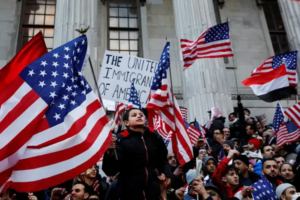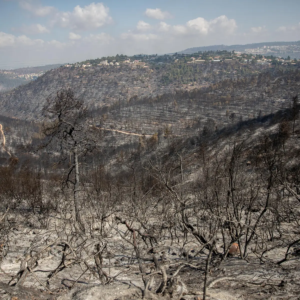Political exploitation of pain and fear has diverted our attention from the goals of the Black Lives Matter movement. Public officials need to work to bring us back to the more important issues.
Several months ago, it seemed as if we were nearing a period of national reckoning on race. Polling showed that a majority of Americans, regardless of political affiliation, supported many of the goals of the Black Lives Matter movement, particularly around reforming policing. Since then, however, the voices for justice and social change have been drowned out by louder and angrier calls for law and order appealing to the racial fears of some Americans. Public officials have an important role in leveraging the resources of their governments to address the underlying causes of this tension and bring their communities together.
Accomplishing these won’t be easy. Millions of Americans are hurting from the coronavirus pandemic, which has taken nearly 194,000 lives while disproportionately impacting Black and Latino communities. At the same time, we’ve seen more high-profile instances of police violence against African Americans, including the shooting in Kenosha, Wis., of 29-year-old Jacob Blake in the presence of three of his young children, leaving him paralyzed.
Adding to the pain and losses has been violence that has erupted at some of the racial-justice demonstrations, often in the provocative presence of armed militia-type counterprotesters. A week after a 17-year-old from Antioch, Ill., was charged with the murders in Kenosha of two BLM protesters, an antifa supporter in Lacey, Wash., was killed by law enforcement officers who were attempting to arrest him for the killing in Portland, Ore., of a man affiliated with a right-wing group.RELATEDRacial Pain and the Empathy We Need from Public OfficialsRacism and Rights: America’s Long, Complicated HistoryPolice Chiefs Most Open to Reform Are the Ones LeavingHow Protests Spread to Small-Town America
Those incidents of deadly violence, however, obscure the reality that the BLM protests across the nation have been overwhelmingly peaceful and multiracial (those killed and implicated in the Kenosha and Portland shootings were white). Local officials have done a reasonably good job of trying to protect life and property, but the number of guns on the streets, along with President Trump’s insistence on condemning the violence on only one side while refusing to show empathy for the families of the deceased and injured, have only made things worse.
Will this exploitation for political purposes of the pain and fear our nation is experiencing work? Some find a glimpse of hope in post-convention polling that shows little change in attitudes among Democratic and Republican voters about their parties’ nominees, particularly on who is viewed more favorably for “keeping Americans safe from harm.”
But it is too early to tell whether we will be able to get back to where we were in the weeks after the killing of George Floyd, when it seemed as if we might be on the precipice of discussing long-needed improvements to race relations. Businesses and organizations were hiring diversity firms to help them develop equity programs, and books on inclusion and antiracism were flying off the shelves. Today much of this has slowed down. The prospects of making progress, or even prioritizing the need to address systemic racism, seem much farther away. Instead, much of the national conversation is being dominated by efforts to whip up fear that the suburbs are going to be overrun by low-income Black and brown citizens.
There also as been too much unproductive debate by the far extremes of both the left and the right on whether to completely defund the police. While some on the right have taken to bearing arms as a show of support for the police, a number of high-profile Black mayors and progressive public officials have felt the need to push back on calls to eliminate all police funding. Newark, N.J., Mayor Ras Baraka, for example, has described the idea of abolishing the police department as a “bourgeois, liberal” approachthat draws attention away from more sensible reforms. New York City Councilman Robert Cornegy Jr. has called the movement to defund police “political gentrification.”
The politicization of law enforcement is dangerous in and of itself, but public officials have the ability to bring us back to more important issues. In addition to working on transforming policing and advancing racial justice, there must be a renewed emphasis on better delivering services in the fields of job training, economic development, affordable housing, public health and education. Given the havoc that the pandemic has wreaked on many state and local budgets, funding for these initiatives will have to come from public officials’ willingness to be creative.
A good place to start in the search for funding is with some questions: Have the hundreds of millions of dollars that states and local governments have forfeited in tax breaks to attract businesses created jobs and stimulated the economy as advocates promised they would? Do we need to hold on to so much governmental real estate when the coronavirus has shown us that many public services can be delivered efficiently online? Should we keep investing in the militarization of our police departments when the public is crying out for more community oriented policing and justice?
Finally, public officials need to do a better job bringing other community leaders to the table to help. The clergy must speak out more about the moral implications of generational poverty and institutionalized racism. Business leaders should do the same, while using their powerful voices, wealth and acumen to help state and local officials figure out the best solutions to solving budgetary issues and how best to govern in a crisis. And the media must do a better job of providing background and context for today’s crises.
Our nation owes a debt of gratitude to the Black Lives Matter movement for bringing front and center the historic problem of police brutality. BLM is more than a slogan to many Americans. It is a mandate for major policy changes at all levels of government and in every facet of society. Public officials must heed this call and play a key role.
Governing‘s opinion columns reflect the views of their authors and not necessarily those of Governing‘s editors or management.




